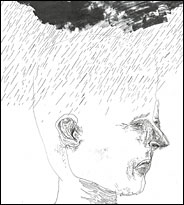 Image by Ted McGrath
Image by Ted McGrath
Peter Kramer’s article, “There’s Nothing Deep About Depression,” which was published in the New York Times magazine in 2005, is truly a classic, if you haven’t already read it in entirety. You can get to the article by clicking here. Here are my favorite excerpts:
Shortly after the publication of my book ”Listening to Prozac,” 12 years ago, I became immersed in depression. Not my own. I was contented enough in the slog through midlife. But mood disorder surrounded me, in my contacts with patients and readers.
I found myself speaking — sometimes about ethics, more often about mood disorders — with many audiences, in bookstores, at gatherings of the mentally ill and their families and at professional meetings. Invariably, as soon as I had finished my remarks, a hand would shoot up. A hearty, jovial man would rise and ask — always the same question — ”What if Prozac had been available in van Gogh’s time?”
I understood what was intended, a joke about a pill that makes people blandly chipper. The New Yorker had run cartoons along these lines — Edgar Allan Poe, on Prozac, making nice to a raven. Below the surface humor were issues I had raised in my own writing. Might a widened use of medication deprive us of insight about our condition? But with repetition, the van Gogh question came to sound strange. Facing a man in great pain, headed for self-mutilation and death, who would withhold a potentially helpful treatment?
Recent research has made the fight against depression especially compelling. Depression is associated with brain disorganization and nerve-cell atrophy. Depression appears to be progressive — the longer the episode, the greater the anatomical disorder. To work with depression is to combat a disease that harms patients’ nerve pathways day by day.
Nor is the damage merely to mind and brain. Depression has been linked with harm to the heart, to endocrine glands, to bones. Depressives die young — not only of suicide, but also of heart attacks and strokes. Depression is a multisystem disease, one we would consider dangerous to health even if we lacked the concept ”mental illness.”
Audiences seemed to be aware of the medical perspective, even to endorse it — but not to have adopted it as a habit of mind. To underscore this inconsistency, I began to pose a test question: We say that depression is a disease. Does that mean that we want to eradicate it as we have eradicated smallpox, so that no human being need ever suffer depression again? I made it clear that mere sadness was not at issue. Take major depression, however you define it. Are you content to be rid of that condition?
Always, the response was hedged: aren’t we meant to be depressed? Are we talking about changing human nature?
I took those protective worries as expressions of what depression is to us. Asked whether we are content to eradicate arthritis, no one says, ”Well, the end-stage deformation, yes, but let’s hang on to tennis elbow, housemaid’s knee and the early stages of rheumatoid disease.” Multiple sclerosis, acne, schizophrenia, psoriasis, bulimia, malaria — there is no other disease we consider preserving. But eradicating depression calls out the caveats.
To this way of thinking, to oppose depression too completely is to be coarse and reductionist — to miss the inherent tragedy of the human condition. To be depressed, even gravely, is to be in touch with what matters most in life, its finitude and brevity, its absurdity and arbitrariness. To be depressed is to occupy the role of rebel and social critic. Depression, in our culture, is what tuberculosis was 100 years ago: illness that signifies refinement.
What stands in the way of our embracing the notion that depression is disease, nothing more?
This question has any number of answers. We idealize depression, associating it with perceptiveness, interpersonal sensitivity and other virtues. Like tuberculosis in its day, depression is a form of vulnerability that even contains a measure of erotic appeal.
The cachet attaching to tuberculosis diminished as science clarified the cause of the illness, and as treatment became first possible and then routine. Depression may follow the same path. As it does, we may find that heroic melancholy is no more.
In time, I came to think of the van Gogh question in a different light, merging it with the eradication question. What sort of art would be meaningful or moving in a society free of depression? Boldness and humor — broad or sly — might gain in status. Or not. A society that could guarantee the resilience of mind and brain might favor operatic art and literature. Freedom from depression would make the world safe for high neurotics, virtuosi of empathy, emotional bungee-jumpers. It would make the world safe for van Gogh.
* Click here to subscribe to Beyond Blue and click here to follow Therese on Twitter and click here to join Group Beyond Blue, a depression support group. Now stop clicking.

